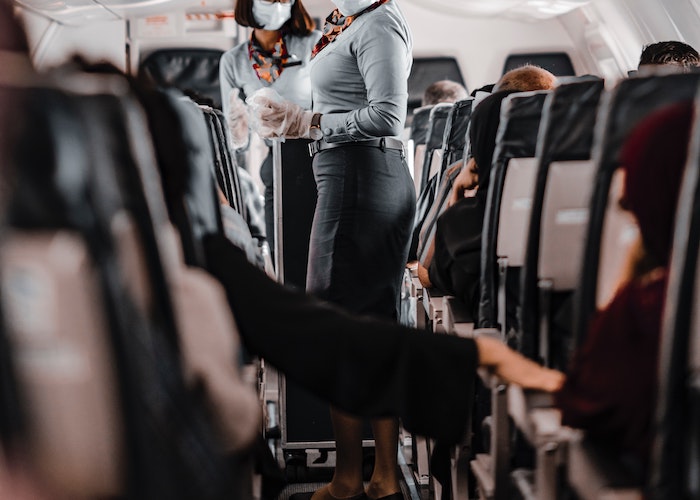23 Ways To Be A Socially (& Financially) Responsible Tourist When Traveling Abroad

Many of us are currently taking the first steps toward our New Year’s resolutions, or (in my case) just hanging on for dear life. These resolutions often include financial goals, like saving up for an emergency fund, a down payment on a house, or enough money to go on a major international trip. Personally, I’m working towards spending Christmas this year in northern Spain.
But once we do finally reach our travel savings goal, it’s important that we make responsible decisions while spending it all on a well-deserved vacation. From lodging, to dining, to shopping, there are plenty of ways that we can ethically spend our travel savings that don’t put local residents in danger of losing their neighborhoods to rising rents, souvenir stores, or multinational chains, as has happened in Venice, Barcelona, and other cities.
I spent three years teaching English in Spain and made the most of my time thereby traveling to places like Paris, Portugal, or Pompeii on holiday breaks. I saw first-hand the impacts of “overtourism” on major European destinations — but I also learned how to travel in a way that respects both local residents and the environment. This post primarily offers suggestions and tips that you can incorporate in a trip to Europe, but they can generally apply anywhere. Bon voyage!
Getting Around
- Fly economy. You can drastically lower your carbon footprint per flight if you fly economy over first class or business, because the airplane’s carbon output is split among more passengers seated in the main cabin versus fewer in first class.
- Take the train. Of course, this isn’t feasible if you’re trying to get from Sweden to Sicily, but for shorter jaunts, trains that run on electric power (often sourced from solar, wind, or nuclear energy) are a much cleaner option than CO2-emitting airplanes.
- Ride the cross-country bus. If you’re a group of friends or a family of four, economies of scale could make renting a car more affordable than bus tickets. Yet intercity buses are so much cheaper compared to the cost of a rental car, and, unlike in America, you can go almost anywhere on a bus, from major metros to far-flung villages.
- Take public transit around town. Metro or commuter trains run on electrified rails, and city buses often use less-polluting compressed natural gas (CNG). Meanwhile, taxis that aren’t Priuses guzzle gas and clog up streets. Riding public transit will cost you sometimes a tenth of what a taxi fare might run you.
- Hail a taxi. I said what I said above, but if the metro has stopped running or you can’t figure out where the night bus goes, put that phone away and wave down a city-regulated taxi. As is often not the case with rideshare apps, drivers will actually know where they’re going (in London, they must memorize The Knowledge™ of city streets). And you’ll be supporting local workers who have invested thousands to display a medallion on their car.
- Reserve a BlaBlaCar trip. This carpooling website sets you up with someone who is already driving the same direction you need to go to. You basically cover their gas and get to chat (“blah blah”) with a local for an hour or two.
- Walk. Using your own two feet costs nothing, harms nobody, and doesn’t pollute the skies. You’ll get a lot of exercise exploring a new city, plus, a walking pace is the perfect speed for experiencing another country.
Staying the Night
- Don’t stay at an Airbnb. I’m not talking about a guest room that someone rents out as a side hustle. I’m talking about entire apartments that have been converted into money-making machines. As this protest banner in Girona, Spain, reads: “Every tourist apartment is a home taken away from the local people.” When landlords convert residential homes into short-term vacation rentals, they decrease the available housing stock; this reduced supply drives up monthly rents for the people who actually live in the city you’re visiting.
- Make a mindful decision about hotels. The knee-jerk reaction would be to eschew multinational hotel chains in favor of bed-and-breakfasts, pensions, or hostels. But chain hotels are often simply franchises that pay a fee each year to operate as a brand. Chains can be an attractive option because they offer amenities and a certain level of quality you can expect, anywhere you go — and getting a good night’s sleep is critical when traveling! Still, remember to be mindful of where your dollars, euros, or pounds are going when you book lodging.
- Stay in neighborhoods outside the city center. Granted, it’s convenient to be close to all the major attractions and the magic of a thousand-year-old city. But businesses that cater to tourists (e.g., hotels, souvenir shops, etc.) can bankrupt businesses that cater to residents (e.g., grocery stores, dry cleaners, etc.) and take homes off the market, raising rents for everyone. Help keep historic neighborhoods alive by dispersing to outer barrios or arrondissements. You’ll feel like you’re the only tourist around and your lodging costs will be much cheaper.
- Don’t go on a cruise. Setting the environmental impact of cruise ships aside, it’s the port days that do a lot of damage to individual cities. Not only do thousands of visitors descend on a single location all at once, putting stress on the local infrastructure, but they also have a negative economic impact by running around, maybe visiting a museum or a church, and then declining to patronize a local restaurant or hotel because dining and lodging are already provided back on the ship.
Eating and Drinking
- Don’t eat at chain restaurants or cafés. It’s fun to visit international branches of McDonald’s or Starbucks to see how they’ve been adapted to another country. But the money you’re spending on a Big Mac or a Frappuccino merely pads shareholders’ bottom lines. Consider instead going to a one-of-a-kind, family-owned restaurant. You might struggle with the menu, but you’ll take in memorable décor, savor Grandma’s recipes, and be served by a father-and-son team who have a passion for their job — and their local cuisine. Why spend all this money traveling halfway across the globe only to have the exact same experience you could get back home?
- Go to local grocers for snacks. Seeing how other people stock up on tomatoes, cereal, and detergent at the foreign equivalents of Safeway or Trader Joe’s can be an eye-opening experience, but if you only need some bread, cheese, and pesto for a picnic, try patronizing a corner grocery store that’s been operated by the same family for a hundred years. Better yet, stop at the greengrocer for some tomatoes, the tiny bakery for a lovely dessert, and the wine shop for a local specialty.
- Shop for groceries at the farmers market. If you decide to stay at a vacation apartment, you can keep food costs low or cater to a restricted diet by cooking your own meals at home. Take this opportunity to support the local economy by picking up your groceries at that famous market everybody takes pictures of but never buys anything at. Hop from the fruit seller to the butcher, the fishmonger to the baker, keeping a cultural institution alive along the way.
- Bring a refillable water bottle. At least in Europe, public water fountains dot every major plaza. The water’s safe to drink, so fill up your Nalgene, save a few bucks on bottled water, and prevent wasteful plastic from going to a landfill. (Feel free to be ~fancy~ and splurge on fizzy water!)
Going Shopping
- Don’t go to tourist trinket shops that sell the same shlock you can find anywhere around the world. You know what I’m talking about: t-shirts, magnets, shot glasses, etc. Consider instead an investment piece at an old-timey hat or shoe shop or artisanal goods listed below. Yes, they will require more financial outlays, but they beat mass-produced junk and will serve as a more meaningful reminder of your trip.
- Go to a specialty food store. The best kind of souvenir is food! When I lived in Spain, I would always stock up on high-quality tinned sardines, affordable saffron, and smoked paprika. Purchases like these not only made the meals I cooked back home more delicious and interesting, but they also reminded me of the wonderful time I spent abroad. Be aware: while wheels of cheese can get through U.S. customs, TSA bloodhounds will sniff out even vacuum-sealed cured ham.
- Go to a local bookstore. Pick up a cookbook, a coffee-table book of nice photography, or even a novel in the language you’re learning.
- Go to a wine boutique. Load your suitcase with the reds, whites, and even bubblies you can’t find back home — or those that bear big markups when available. You may also want to take home a bottle of the local liqueur (think Portuguese cherry ginginha or an herb-infused eau-de-vie). Just make sure to securely pack them in special wine packs, lest you open up your suitcase to wine-drenched clothes.
In General
- Travel outside of high season (typically June through August) if you have flexible time off. Not only will you skip out on the hottest, stickiest months of the year, you’ll also save money on slashed hotel fares. An added bonus of low-season travel: you’ll sustain local industries throughout the year, preventing wild swings in employment and income.
- Take public transit instead of hop-on, hop-off buses. Sure, these double-decker buses make it easy to get the lay of the land, but they tend to dump dozens of visitors off all at once, flooding locations. Pay a fraction of the cost for a day pass on the metro, city bus, or tram, and see how normal people commute, see friends, or go out at night. Travel is an adventure — embrace the metro!
- Avoid gigantic tour groups. Large groups overwhelm places and make everyone else’s experience miserable, whether it’s at an art museum, a restaurant, or a pedestrian street. Do your own research ahead of time by reading the guidebook. Download a free podcast “walking” tour (I’m a fan of Rick Steves), splurge for the handheld museum audioguide, or contract with guides that lead groups of no more than a dozen.
- Arrive with the mindset that the city is not a theme park for tourists — it’s someone else’s home. Don’t engage in drunken antics if you wouldn’t do the same in your hometown. Don’t disrupt a religious service by taking photos, talking loudly, or mulling about if you wouldn’t want randos doing the same at your own place of worship. And don’t expect everyone to speak to you in English if you won’t take the time to learn Spanish or Mandarin in the U.S.
Tourism is currently one of the most important industries for many countries, but overtourism threatens to destroy the very communities that depend most on this sector of the economy. Making informed decisions about how we spend our hard-saved money on the trips we take can help keep travel a sustainable activity while also preserving long-held traditions and unique neighborhoods. After all, that’s what we’re traveling to experience, right?
Trevor Huxham works in non-profit fundraising in Phoenix, Arizona, where he is an avid hiker and photographer. Find him online on Instagram, Twitter, or his travel blog.
Image via Unsplash
Like this story? Follow The Financial Diet on Facebook, Instagram, and Twitter for daily tips and inspiration, and sign up for our email newsletter here.




